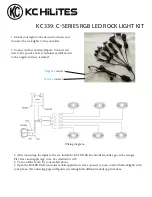
142
Before starting the engine, be sure to fol-
low the instructions in “(a) Before crank-
ing”.
Normal starting procedure
The multiport fuel injection system/se-
quential multiport fuel injection system in
your engine automatically controls the
proper air-fuel mixture for starting. You
can start a cold or hot engine as follows:
1. With your foot off the accelerator ped-
al, crank the engine by turning the key
to “START”. Release it when the en-
gine starts.
2. After the engine runs for about 10 sec-
onds, you are ready to drive.
If the weather is below freezing, let the en-
gine warm up for a few minutes before
driving.
If the engine stalls...
Simply restart it, using the correct proce-
dure given in normal starting.
If the engine will not start—
See “If your vehicle will not start” in Part 4.
Do not crank for more than 30 sec-
onds at a time. This may overheat
the starter and wiring systems.
Do not race a cold engine.
If the engine becomes difficult to
start or stalls frequently, have the
engine checked immediately.
NOTICE
Always slow down in gusty cross-
winds. This will allow you much better
control.
Drive slowly onto curbs and, if pos-
sible, at a right angle. Avoid driving
onto high, sharp-edged objects and
other road hazards. Failure to do so
can lead to severe tire damage result-
ing in tire bursts.
When parking on a hill, turn the front
wheels until they touch the curb so that
the vehicle will not roll. Apply the park-
ing brake, and place the transmission
in “P”. If necessary, block the wheels.
Washing your vehicle or driving
through deep water may get the
brakes wet. To see whether they are
wet, check that there is no traffic near
you, and then press the pedal lightly. If
you do not feel a normal braking force,
the brakes are probably wet. To dry
them, drive the vehicle cautiously
while lightly pressing the brake pedal
with the parking brake pulled. If they
still do not work safely, pull to the side
of the road and call a Toyota dealer for
assistance.
Always check your breaks for effec-
tiveness immediately after driving
across sand, mud, water or snow.
(b) Starting the engine
Tips for driving in various
conditions
Summary of Contents for Previa
Page 4: ......
Page 6: ...2 Instrument panel overview ...
Page 7: ...3 ...
Page 8: ...4 Instrument cluster overview ...
Page 10: ...6 ...
Page 87: ...82 ...
Page 102: ...97 Button display for radio cassette tape player compact disc player Type 3 ...
Page 127: ...122 ...
Page 145: ...140 ...
Page 157: ...152 ...
Page 175: ...170 ...
















































